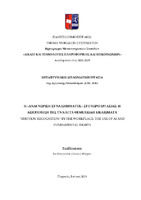Η «αναγνώριση συναισθήματος» στο χώρο εργασίας : η αξιοποίηση της ΤΝ και τα θεμελιώδη δικαιώματα
“Emotion recognition” in the workplace : the use of AI and fundamental rights

View/
Keywords
Τεχνητή Νοηµοσύνη (ΤΝ) ; Τεχνητή Νοηµοσύνη (ΤΝ) αναγνώρισης συναισθηµάτων ; Χώρος εργασίας ; Θεµελιώδη δικαιώµατα ; Πράξη την Τεχνητή Νοηµοσύνη (ΤΝ)Abstract
This thesis examines AI systems that are used for emotion recognition in the workplace. First,
the attempt to define AI and basic concepts such as algorithms and data mining are presented.
Emotion recognition AI, i.e. the ability of AI systems to detect, understand and interpret human
emotions, through facial expressions, sound and other biometric parameters, is then analyzed.
Next, the use of these technologies in the workplace is listed, such as in the recruitment process,
employee monitoring, and which companies are using these systems. It emphasizes both the
dynamics of the systems and the potential benefits for employers and employees, as well as the
negative views of employees regarding them. The fourth chapter examines the legal dimensions
of the use of AI to recognize emotions, focusing on fundamental rights such as human dignity,
freedom of expression, equality, privacy and the protection of personal data. Special reference is
made to the interpretation of emotional data as potentially sensitive personal data under the
GDPR. The fifth chapter focuses on the new EU AI Regulation, analysing the risk-based approach
and the categories of prohibited and high-risk systems, focusing on banning AI emotion
recognition systems in the workplace. Despite the Regulation's provision for a ban on the use of
AI systems for recognizing emotions in the workplace, the paper identifies interpretative
ambiguities, legislative gaps and problematic points regarding the AI Act. Finally, the paper
concludes with conclusions and reflections on the validity of systems and the risks they pose to
workers' rights, as well as on the unclear points of the current legislative framework for AI,
highlighting the human-centric nature of the legislative approach that should be followed in the
EU, in order for AI to serve humans – and not the other way around.


